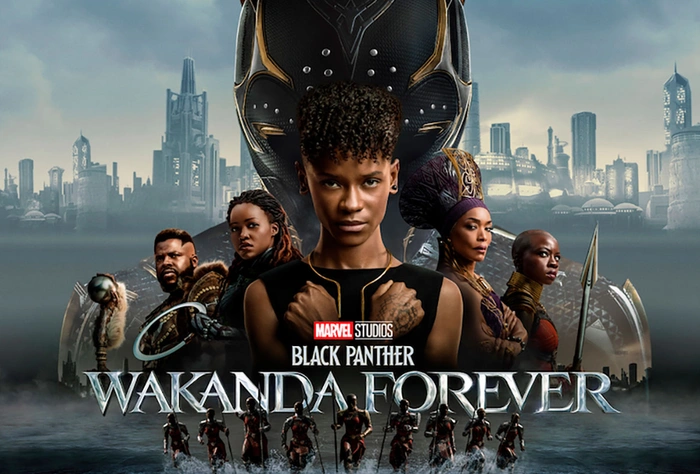In the wake of Chadwick Boseman’s tragic death, the Black Panther franchise was put on pause, and for good reason. The news shook people around the world in 2020, as well as the cast and crew who grew close to him. Boseman wasn’t just a good actor; he truly embodied the spirit of his character T’Challa and was an inspiration to many. A couple years after his passing, his legacy is still strongly felt.
As Marvel decided to move forward with a second film, there was much deliberation on how to move the story forward in a way that honors his rich legacy. The main characters face those very same questions in “Wakanda Forever.”
In the sequel, we see Wakanda grappling with the death of its king and establishing their place in the world. As other nations seek out their resources, the leaders are forced to make decisions that could alter the trajectory of their kingdom.
“Wakanda Forever” is a touching tribute to Boseman and his legacy with striking visuals, thrilling action and an awe-inspiring performance from Angela Bassett. Beneath these exciting elements is a story that draws parallels to important socio political discussions.
Where do you draw a line between integration and separation? How does a society adapt to changes outside of its borders? What does it mean to be a king?
This film explores these core questions and many more over its 168 minute runtime. “Wakanda Forever” thrives in large part because of the creative team led by director Ryan Coogler and co-writer Joe Robert Cole.
Historically, Marvel’s achilles heel has been visual storytelling. While Taika Waititi’s absurd humor is delightful, “Thor: Love and Thunder” was a visual mess. Years before that, critics bemoaned the flat look of “Ant Man,” “The Incredible Hulk” and “Black Widow.” They do a consistently excellent job with character development, but at the expense of visuals.
Even the brighter, poppier entries such as “Thor Ragnarok” and “Captain Marvel” prioritized quips and exposition over visual subtlety.
Conversely, this is where Coogler shines. He lets shots linger, leaving the actors to deliver emotional dialogue-led scenes without interruption. The simpler moments are treated with delicacy and subtlety. The film has some beautiful cinematography and more eye-catching colors that flesh out the world in a way their other films haven’t.
The action scenes are rather impressive too. The real difference maker here is the emphasis on sound. Every punch that’s thrown has weight to it. The threats to Wakanda are worthy foes, with real strength unlike clones in Star Wars or generic armies in lower quality action films. There’s plenty of whimsical elements to the film, but many of the fights feel somewhat grounded.
Furthermore, Coogler and Cole’s screenplay creates an environment in which the strong ensemble cast can make an impact.
Undoubtedly, the most impressive performance comes from Queen Ramonda (Angela Bassett). Bassett plays Ramonda with vulnerability and power, and contributes to one of the most emotional scenes in the film. The original Black Panther film was nominated for several Academy Awards in 2018, so don’t be surprised if Bassett makes a run for a supporting actress nomination this year.
Shuri (Leticia Wright) and Okoye (Danai Gurira) get more of a chance to shine in expanded roles. Shuri is given the most emotionally demanding role in the film, while Okoye provides well-timed comedic relief. They’re able to strike a balance in which the humor never downplays the gravity of the scenes.
Newcomers Namor (Tenoch Huerta) and Riri (Dominique Thorne) are worthy additions to the franchise. Namor in particular is given compelling motivations that put him at odds with the leadership of Wakanda. The absence of Boseman in the cast is felt, but this powerful ensemble does his story justice.
With other characters receiving more of the spotlight, M’Baku (Winston Duke) and Nakia (Lupita Nyong’o) are left to smaller roles. It’s a shame because the two actors, who led 2019’s “Us,” are excellent performers.
The negatives in “Wakanda Forever” are few and far between. As with most recent Marvel projects, there’s some iffy visual effects. Obviously, Boseman’s absence hurts too. More can be written about the implications of the third act of the film, but this is a spoiler-free zone.
Whether you’re a fan of the recent MCU projects or you’ve become jaded by their output, “Wakanda Forever” is a film that I’d recommend to all movie goers. It’s clear that the team behind this film truly cared about bringing this story to light. The film is exciting and emotional, and is sure to spark discussion.







